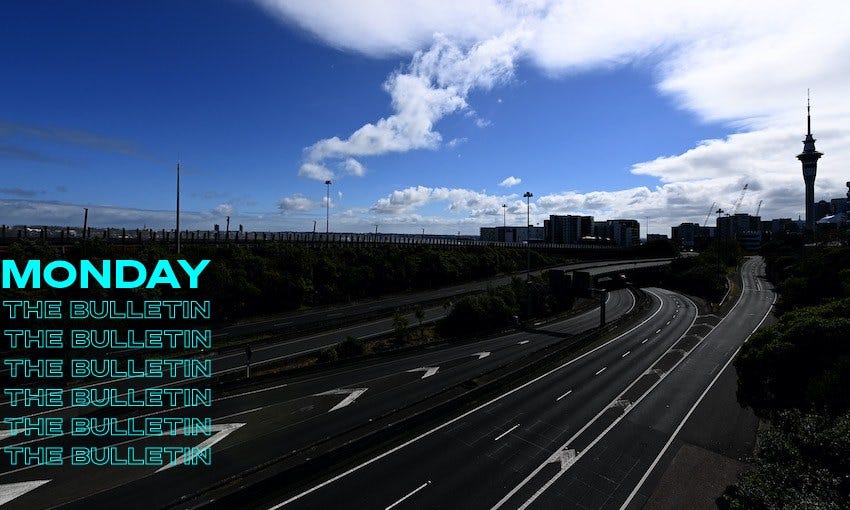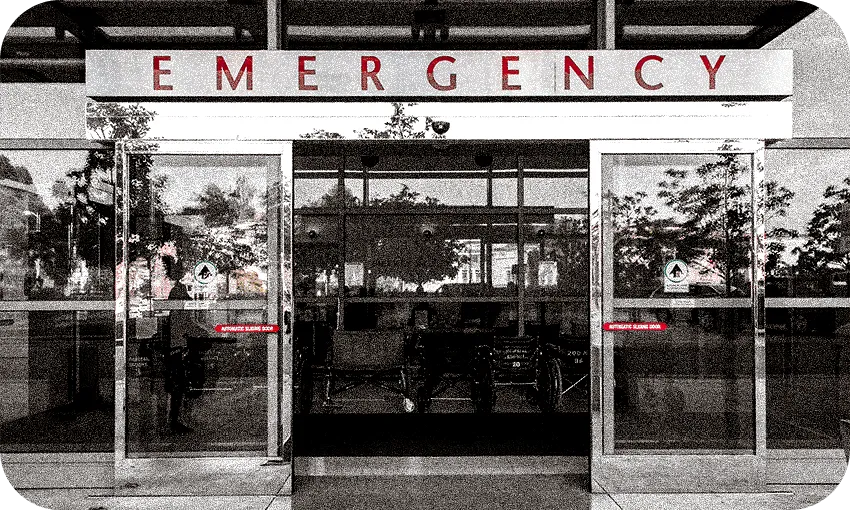Two years after lockdown
Since the country first went into level four, New Zealand and the world has changed in ways both big and small. It's now Covid World.
Mōrena and welcome to The Bulletin for Monday, March 28, by Justin Giovannetti. Presented in partnership with Z Energy.
In today’s edition: Tough clean up starts in Tairāwhiti; concerns over new Solomons alliance; Z Energy sale almost done; but first, what we’ve learned over the past two years of Covid.
Empty motorways in Auckland during alert level four. (Hannah Peters/Getty Images)
How New Zealand changed since we first locked down.
New Zealanders woke up on March 26, 2020 to a country in lockdown for the first time. Roads were empty, the prime minister asked people to “be kind” and you were. There was an optimism that after one bout of level four, future waves could be avoided. Looking back at The Spinoff’s live updates from that day, you can sense the country’s apprehension and tenacity. We now find ourselves in a much different position. Our third major wave of Covid peaked last week, but over 10,000 omicron cases are still being detected daily. Covid is now with us, likely for a very long time. 1News looked at the two years since that first day of lockdown.
It’s a question of fairness.
I was struck by The Bulletin that came out on March 26, 2020. Alex Braae wrote that the national emergency raised a series of questions of fairness. Two years later, his warnings ring louder than ever. The pandemic would, he wrote, raise issues for employees facing a demand to keep working despite the pandemic. It would put consumers in a difficult spot as supermarket chains raised prices on pretty much everything. It would also cause homeowners and tenants to be direct competition. While he couldn’t have predicted the scope of pandemic restrictions or a future where hundreds of thousands would stay home because they or a family member was sick, each of those warnings came to pass. The Sunday Star-Times wrote yesterday that the cost of living crisis has now reached a point where no hacks are left for low-income households. Even if they cut back on all the expenses they can, the costs of basics alone mean they are falling behind.
Tourists are almost back, but businesses face challenges.
The narrative about reopening isn’t as straightforward as it once seemed. Hayden Donnell reported in Mediawatch that despite looser Covid restrictions, businesses aren’t doing better. After two years of calling for a damn the torpedoes approach to Covid, businesses are getting it. The resulting increase in personal responsibility has revealed an unexpected response. It shouldn’t have. It isn’t government restrictions making people stay home, it’s Covid. That extends beyond New Zealand’s border. While some international tourists will return within the coming months, most are years away, Stuff reports. China remains closed, everyone else is very far away, during a pandemic when flight schedules are still unreliable and catching the virus remains a worry. There’s also a war on.
An orange light is flashing over the rest of the economy.
The mother of all housing booms is over. Prices fell in 154 suburbs across the country over the past three months, Miriam Bell wrote for Stuff. After growing through lockdowns and new variants of Covid, the housing market has reached a turning point and could drop by as much as 10% this year. Southern farmers are also facing a series of problems, with droughts, staff shortages and omicron outbreaks through the supply chain. It’s a “perfect storm” according to 1News. Meat plants are operating below capacity, some at only half of output.
What the future holds for Aotearoa.
Siouxsie Wiles has written in The Spinoff about what comes next. She remains nervous and disappointed with the government’s decision to bring down restrictions. It’s telling that Wiles now sees Covid through the same lens as HIV. Not the flu. There will be treatments and vaccines to reduce the severity of infections, but many around the world won’t get easy access to them. There will be no return to the pre-Covid world of 2019. Wiles concludes, correctly from my vantage in the press gallery, that the government’s goal now is to keep hospitalisations at a manageable level with the least number of restrictions. That’s very different from the approach of two years ago.
It’s unclear if the government could return the country to that approach again. There’s been commentary in recent days about just how different the prime minister’s recent speeches have been to what they once were. Labour’s most ardent supporters would admit that what was once a masterclass in communication is now clearly not. But why? Writing in Stuff, Janet Wilson has compared the prime minister’s speeches from 2020 and 2022. While Wilson has past connections with National, she’s a PR expert and it’s hard to argue with her conclusions.
Flooding in Tairāwhiti ‘extremely tough’ as clean up starts.
Hatea-a-Rangi school in Tokomaru Bay was struck by floodwaters last June. Its classrooms have now been inundated by mud after more flooding on the East Coast. RNZ reports the prime minister visited the school yesterday and said the area will need some time to recover. Some roads and bridges have been washed out. The NZ Herald looks at how locals have found a way to still get beer to isolated communities.
Biden calls Putin a ‘butcher’, Russia walks back ambitions in Ukraine.
US President Joe Biden struck his most combative tone since the war in Ukraine began, seeming to back regime change in Russia during a historic speech in Poland. “For God’s sake, this man cannot remain in power,” said Biden. The Observer reports that Russian missiles hit Lviv, the Ukrainian city closest to Poland, in defiance. The White House later clarified that Biden wasn’t calling for regime change. According to Newsweek, Biden meant that Russian president Vladimir Putin couldn’t continue to exercise power over his neighbours. On the weekend, the Russian military said that its mission in Ukraine was almost over and its ambitions were limited to the eastern Donbas region. It could be the first sign of face-saving spin for what has been a disastrous military failure.
NZ and Australia worried about Chinese influence in Solomons.
Foreign affairs minister Nanaia Mahuta is warning that a leaked security deal between the Solomon Islands and China could destabilise the region’s security. 1News explains that unrest in the islands has been historically handled by New Zealand and Australia. Both countries had to send troops to quell unrest in November. The new security deal could extend to giving China military and naval access to the country. The BBC reports that the deal sets out how Beijing could deploy troops to the country to protect Chinese projects and personnel. Why does this matter? The Solomon Islands control the main shipping routes to Australia and New Zealand.
Z Energy sale to Australian ownership nearly done.
The shareholders of the country’s largest fuel retailer overwhelmingly supported its sale to an Australian fuel company. RNZ reports that the nearly $2 billion sale to Ampol is now nearly done. The Commerce Commission approved the sale of Z Energy (who supports this newsletter) last week, as long as Ampol sells off its Gull operation. The war in Ukraine has increased the price of petrol, but retailer margins are under government scrutiny and sales volumes are likely down.
It’s Pet Week at The Spinoff.
There are more than 4.35 million pets in Aotearoa, we think it’s about time they got a whole week of content. Alex Casey writes that through lockdowns and Covid, our furry (or not) members of the family have taken a more central role in our lives. “Dogs have dragged people out of the house for their daily walks. Cats have got stuck up trees (mine), forcing hilarious socially distanced interactions with neighbours. Vets have been flat out. People have taken pet grooming into their own hands, with mixed results,” she writes. Prepare for a week of pet puns.
Got some feedback about The Bulletin, or anything in the news? Get in touch with me at thebulletin@thespinoff.co.nz
Scott Orman, an emergency medicine specialist, explains that New Zealand is in a healthcare crisis. Giovana Tabarini tells the story of her partner’s mother as she attempts to flee Ukraine. Chris Schulz asks if Aotearoa is ready for the impossible burger. Will Hansen writes a trans history of gay liberation in New Zealand. Kristina Cavit in the Sunday Essay on 11 years of waiting for an answer.
Spanish media report next America’s Cup will be held in Barcelona.
An announcement on the venue for the 2024 America’s Cup is expected on Thursday, but two Spanish cities, Cork in Ireland and Jeddah in Saudi Arabia are on the shortlist. Newshub reports that the Spanish publication Cronica Global claims Barcelona will pay $70 million Euros (NZ$110m) for the rights to host. Team New Zealand wouldn’t comment before announcing a decision.












